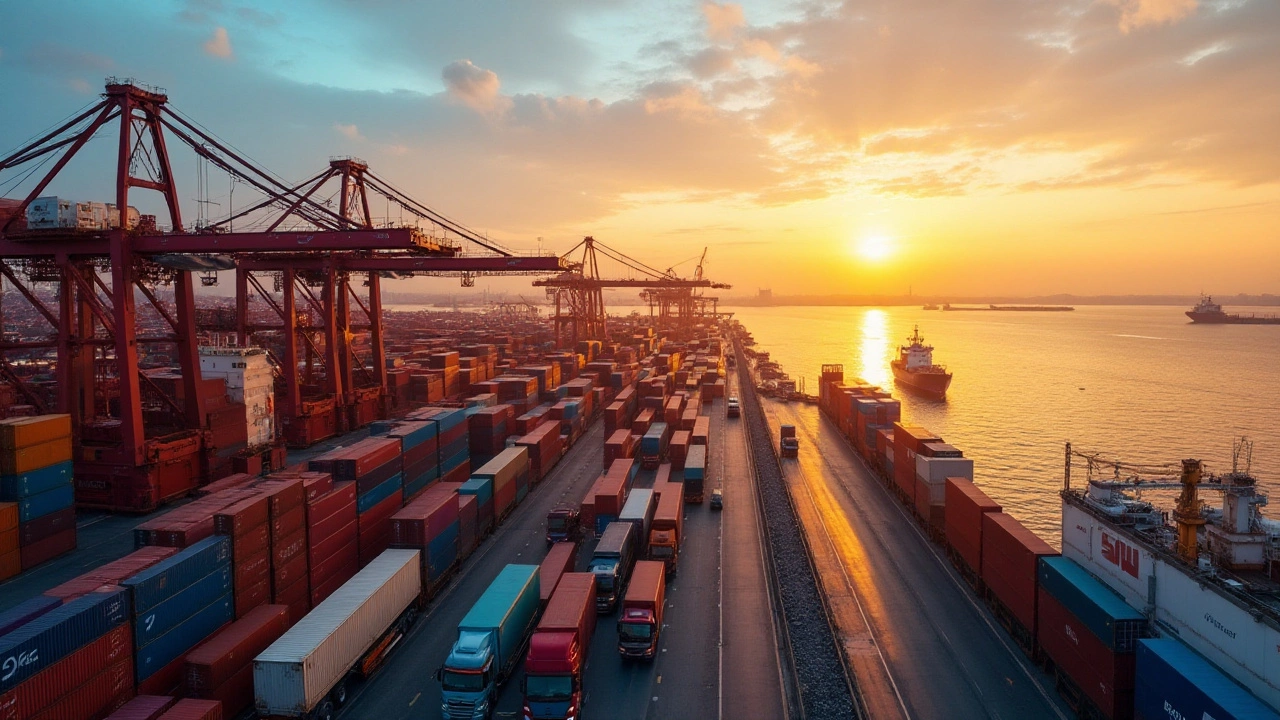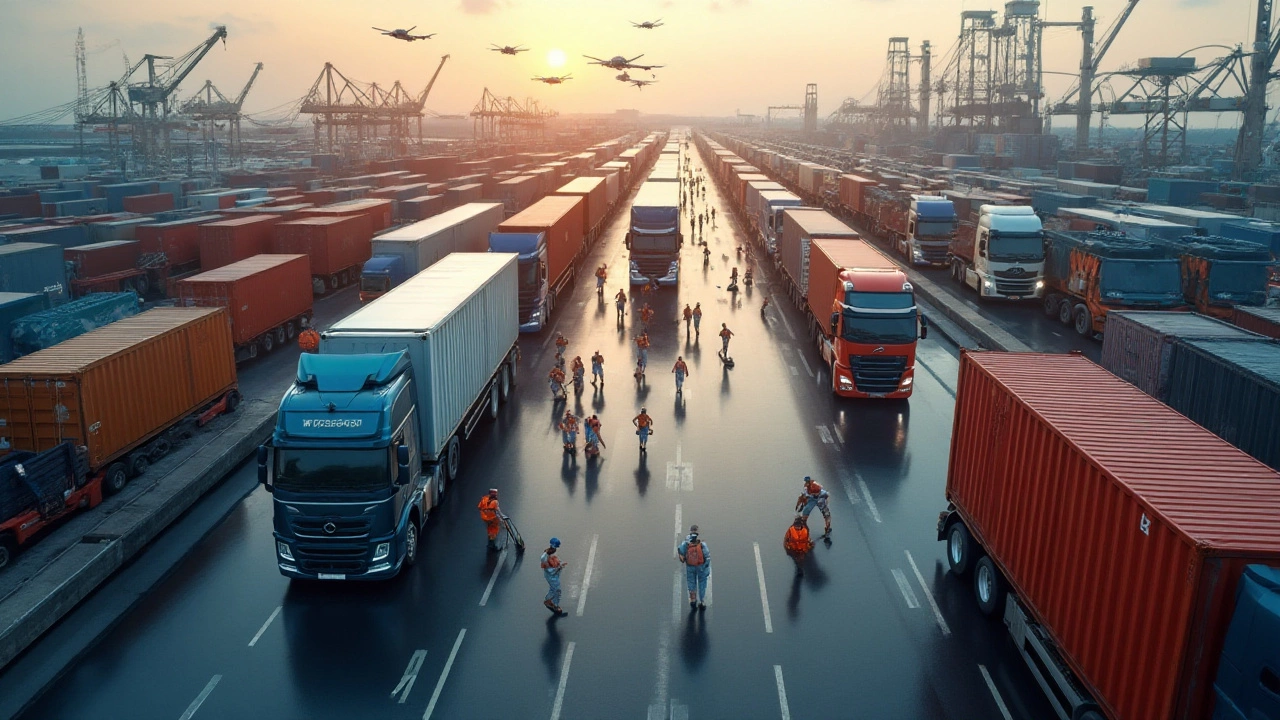In today's connected world, logistics companies play a pivotal role in the movement of goods across the globe. The industry itself is a well-oiled machine, orchestrating the complex processes that ensure items reach their destinations efficiently and safely. Understanding which logistics companies dominate the field and what sets them apart can offer insightful perspectives on global trade dynamics.
Leading logistics firms are more than just shipping companies—they're innovators, problem-solvers, and key players in a constantly evolving market. These giants have honed their strategies to become frontrunners in the supply chain, each with their unique approach to tackling the ever-present challenges of the trade. As we delve into the world of logistics, we aim to uncover the secrets behind their success and their profound impact on our daily lives.
- Understanding the Logistics Landscape
- Leaders in the Industry
- Innovative Strategies Driving Success
- Challenges Facing Logistics Companies
- The Future of Global Logistics
Understanding the Logistics Landscape
The logistics landscape is an intricate network that ensures products are moved seamlessly from producers to consumers across vast distances. This sprawling ecosystem involves numerous stakeholders, ranging from manufacturers and transportation firms to end consumers. Each entity in this supply chain plays a critical role, and the effectiveness of their collaboration determines the efficiency of global trade. The landscape is constantly evolving, with companies adopting new technologies and strategies to stay ahead in this fast-paced world.
At the heart of this system lie the logistics companies themselves, who orchestrate the various phases of storage, transportation, and delivery. Their task is not simply to move goods but to do so at the right time, through the best possible routes, and at the optimal cost. Some companies have mastered this art through years of experience, while others leverage cutting-edge technologies like blockchain, artificial intelligence, and Internet of Things (IoT) to streamline their operations. With rising demand for rapid delivery, logistics companies constantly innovate to meet customer expectations.
The sheer scale and complexity of logistics cannot be overstated. The industry contributes significantly to economies worldwide, providing jobs and facilitating trade connections between countries. According to a report by the International Transport Forum, global freight demand could grow threefold by 2050, highlighting the immense potential for expansion and the need for sustainable practices. This growth presents both opportunities and challenges for logistics companies as they strive to balance economic goals with environmental responsibilities.
To better capture the intricacies of this landscape, let's consider a statistic: according to Statista, the global logistics market was valued at approximately $9.1 trillion in 2022. Such figures not only demonstrate the financial importance of logistics but also underscore the sector's impact on everyday life. Everything from the food we eat to the electronics we depend on is delivered through these vast networks. With their sights set on the future, logistics companies are turning to digital solutions to foster agility and enhance performance, ultimately reshaping how goods traverse the globe.
Leaders in the Industry
In the vast world of logistics, certain names resonate with both industry experts and consumers alike. These trailblazers not only offer efficient solutions but also set the trends for the future of global trade. One of the most prominent logistics companies is DHL Express. Known for its yellow and red branding, DHL has built a robust network that spans every corner of the globe. Their extensive range of services, from document delivery to large freight shipments, makes them a household name in the logistics industry. DHL’s innovative approach, such as their experiments with drone deliveries and green logistics, shows how they are continually pushing the envelope.
Another powerhouse in the industry is the American behemoth, UPS. Famous for their distinct brown delivery trucks, UPS has crafted a reputation for reliability and efficiency. They excel in their logistics network through state-of-the-art systems and technology that meticulously track packages worldwide. With origins dating back to 1907, UPS has evolved from a simple messenger company to a logistics titan by investing heavily in infrastructure and workforce development. Their emphasis on using technology, including AI and machine learning, to optimize routes and improve delivery times highlights their commitment to innovation.
According to a recent report by Forbes, "UPS’s dedication to technological advancement is not just about improving its logistics operations but also about setting industry standards."
FedEx, another giant in the logistics landscape, is known for revolutionizing overnight shipping. Their “when it absolutely, positively has to be there overnight” mantra has marked the company as a leader in express delivery services. FedEx's pioneering of the tracking system, allowing customers to monitor their parcels in real time, was a game-changer in shipping. Their continuous commitment to advancements, such as testing autonomous vehicles and developing eco-friendly packaging, demonstrates their adaptability and foresight in a rapidly changing market.
Shipping industry titans like Maersk also contribute significantly to the logistics sector. As one of the world's largest container shipping companies, Maersk's influence reaches into every port worldwide. They are not just focused on moving goods across seas but are deeply engaged in improving supply chain efficiencies. Their digital innovations and focus on sustainability, such as reducing carbon emissions from their massive fleet, set them apart as industry leaders striving toward a greener future.
Global Trends and Innovations
Size and reach don't necessarily define leadership in logistics. Companies like XPO Logistics and C.H. Robinson also lead through their innovative solutions and adaptable supply chain strategies. XPO, for instance, is making waves with its focus on logistics automation and digital freight management, while C.H. Robinson revolutionizes supply chain strategies with their expertise in fresh produce transportation. As logistics companies continue to evolve and adapt, these leaders will likely set the pace and share insights for addressing the challenges of an unpredictable global market.
Innovative Strategies Driving Success
The logistics industry is a bustling arena where only the sharpest strategies lead to success. In recent years, some logistics companies have outpaced others by embracing cutting-edge technologies and rethinking traditional supply chain models. The fusion of digital innovation and logistics has resulted in systems that are faster, more reliable, and more efficient than ever before. Companies like DHL and FedEx are no strangers to such transformations—they've been at the forefront, implementing new methods that streamline transport and enhance the customer experience. With the rise of e-commerce, logistics operators saw an opportunity to reinvent themselves, making parcel deliveries quicker and more predictable, even during peak shopping seasons.
One standout trend has been the adoption of robotics and automation. Warehouses are becoming high-tech arenas where robots sort, pack, and dispatch goods with astounding speed and accuracy. This has not only reduced human error but significantly increased throughput, allowing logistics companies to manage larger volumes without compromising on quality. For instance, Amazon's fulfillment centers with their armies of robots are a testament to how integrated systems can boost efficiency. The result is a faster shipping process that satisfies the growing demand for same-day and next-day deliveries.
Big data analytics is another vital cog in the logistics wheel. By interpreting vast amounts of data, companies can gain insights into shipping trends, optimize delivery routes, and predict potential disruptions. Companies like UPS utilize advanced algorithms to determine the most efficient paths for their fleets, saving fuel and reducing carbon footprints. This data-driven approach not only cuts costs but also helps in making strategic decisions that can enhance customer satisfaction. As tech continues to evolve, the potential for more refined analyses will only increase, offering logistics firms a plethora of opportunities to improve their operations.
Blockchain technology, still emerging yet very promising, is revolutionizing how logistics companies track goods. The immutable ledger offers unparalleled transparency and security in supply chains, ensuring that every transaction is recorded and verified. This could greatly reduce fraud and errors in shipping, providing a level of trust and assurance to businesses and customers alike that was previously unattainable. Maersk, in collaboration with IBM, has embarked on initiatives to develop a global trade digitization platform, highlighting how blockchain can be leveraged to streamline end-to-end shipment processes.
As logistics companies continue to push the boundaries of what's possible, the incorporation of sustainable practices has also taken center stage. Given the environmental implications of global shipping, there is a growing trend towards greener logistics. This includes the use of electric vehicles, optimized routing to reduce emissions, and investment in renewable energy sources. Industry leaders are setting ambitious targets to lower their carbon footprints, recognizing that sustainability isn't just a buzzword, but a necessary step towards future-proofing their operations. By shifting towards eco-friendly solutions, logistics firms not only contribute positively to environmental efforts but also appeal to the increasingly eco-conscious consumer base.
"Emphasizing sustainability in logistics isn't just about reducing a company's carbon footprint, it's about creating resilient systems that benefit the environment, customers, and the business itself," remarks Chris Caplice, a research expert in logistics at MIT. This shift highlights a crucial transition, where profitability meets responsibility, shaping a new paradigm for the logistics industry.
Challenges Facing Logistics Companies
The logistics industry, crucial to the smooth operation of global trade, is no stranger to challenges. As the demand for faster, more efficient shipping methods increases, logistics companies grapple with a multitude of hurdles that can make or break their operations. One primary concern is managing the complex supply chain systems in an unpredictable global market. These systems, interconnected by a network of suppliers, manufacturers, and distributors, require precise coordination. Any disruption, such as political instability or natural disasters, can cause significant delays, leading to increased costs and dissatisfied customers.
Another significant challenge is the rise in global trade regulations and tariffs, which vary greatly across regions. Logistics companies must navigate these regulations to ensure compliance while minimizing impact on delivery times and costs. The introduction of new environmental policies also necessitates investment in sustainable practices, like reducing carbon footprints and enhancing energy efficiency. This transition, while essential, requires substantial resources and innovation. A leading logistics executive once noted, "Sustainability is no longer just a nice-to-have. It is a business imperative."
Technological developments offer both a solution and a challenge. While advancements in automation and digitalization can enhance operational efficiency, the integration of such technologies requires significant investment. Implementing these systems often means retraining staff and restructuring workflows, which can be daunting for established companies. Moreover, the risk of cyber-attacks looms large, as digital infrastructures become vital to logistics operations. Protecting sensitive data from breaches is paramount, yet often underestimated, considering the potential cost of a cyber incident.
The issue of labor remains a pressing concern, especially with the ongoing shortage of skilled workers willing to engage in traditional logistics roles. As the industry evolves, the need for tech-savvy talents increases, yet the supply of such individuals lags behind demand. This skill gap necessitates higher wages and investment in training programs, which adds to operational expenses. At the same time, logistics companies must work hard to cultivate a work environment that attracts and retains talent, as any loss of experienced personnel can considerably impact service levels.
The logistics industry must become more resilient, innovative, and collaborative to overcome its challenges, say leaders at the World Economic Forum.
Lastly, global health issues, highlighted by the COVID-19 pandemic, have emphasized the fragile nature of supply chains. Contingency planning and inventory management have become vital as companies strive to enhance resilience. With the varying impacts of pandemics across regions, maintaining a consistent supply chain becomes increasingly complex, often requiring innovative solutions and cross-border collaborations to ensure products reach their final destination efficiently.

The Future of Global Logistics
The logistics industry stands at a critical juncture, poised to redefine the way goods move across the world in the coming decades. With the rapid advancement of technology, logistics is not only keeping pace with innovation but is often at its helm, forging new pathways and revolutionizing trade practices. As companies strive to improve efficiency and sustainability, they are embracing technologies such as artificial intelligence, the Internet of Things (IoT), and blockchain. These innovations are not mere buzzwords but form the backbone of futuristic logistics systems that enhance transparency, traceability, and security across supply chains.
One of the most transformative trends in logistics is the integration of AI and machine learning. These technologies are harnessed to predict demand, optimize routes, and manage inventory with unprecedented accuracy. By analyzing data patterns, logistics managers can make informed decisions, reducing costs and improving delivery times. For instance, AI-powered systems can forecast shipping trends, helping companies to preemptively address potential bottlenecks and enhance customer satisfaction. Alongside, IoT devices deployed across fleets provide real-time insights into vehicle performance and cargo conditions, ensuring goods not only arrive on time but in perfect condition.
Blockchain technology, often associated with cryptocurrencies, also holds significant potential in transforming logistics. By creating immutable records of transactions and shipments, blockchain enhances transparency and trust between stakeholders, from manufacturers to end consumers. Companies like Maersk are already exploring blockchain solutions to streamline their complex logistic operations, reducing paperwork and minimizing the risk of fraud. These innovations ensure a streamlined flow of goods and information, crucial for the efficient functioning of global supply chains.
With sustainability becoming a priority, logistics companies are also focusing on reducing their carbon footprint. Electric vehicles and drones are progressively being integrated into delivery operations, significantly cutting emissions. Many companies have pledged to adopt greener practices, aligning with global efforts to combat climate change. In the words of a logistics executive, "Embracing green technology isn't just about reducing emissions—it's about future-proofing our business for generations to come." This commitment to sustainability is driving investment in renewable energy sources and fostering innovation in eco-friendly packaging solutions.
In the ever-evolving landscape of logistics, the role of automation cannot be overstated. Autonomous vehicles and robotics are revolutionizing warehousing and delivery processes, enhancing speed and efficiency while reducing dependency on human labor. Warehouses are now equipped with automated sorting systems that handle thousands of packages with precision and speed. According to a recent study, the deployment of robots in warehouses can lead to a 40% increase in productivity, demonstrating the significant impact of automation in logistics.
Amidst these technological advancements, companies must also navigate emerging challenges, including cyber threats and regulatory changes. As logistics becomes more digitized, securing digital infrastructure against cyberattacks is paramount. Meanwhile, companies must stay abreast of shifting trade policies and regulations to ensure seamless cross-border operations. Looking ahead, the future of global logistics will undoubtedly be shaped by how companies adapt to a digital-first world, pushing boundaries and redefining what's possible in the movement of goods across continents.


